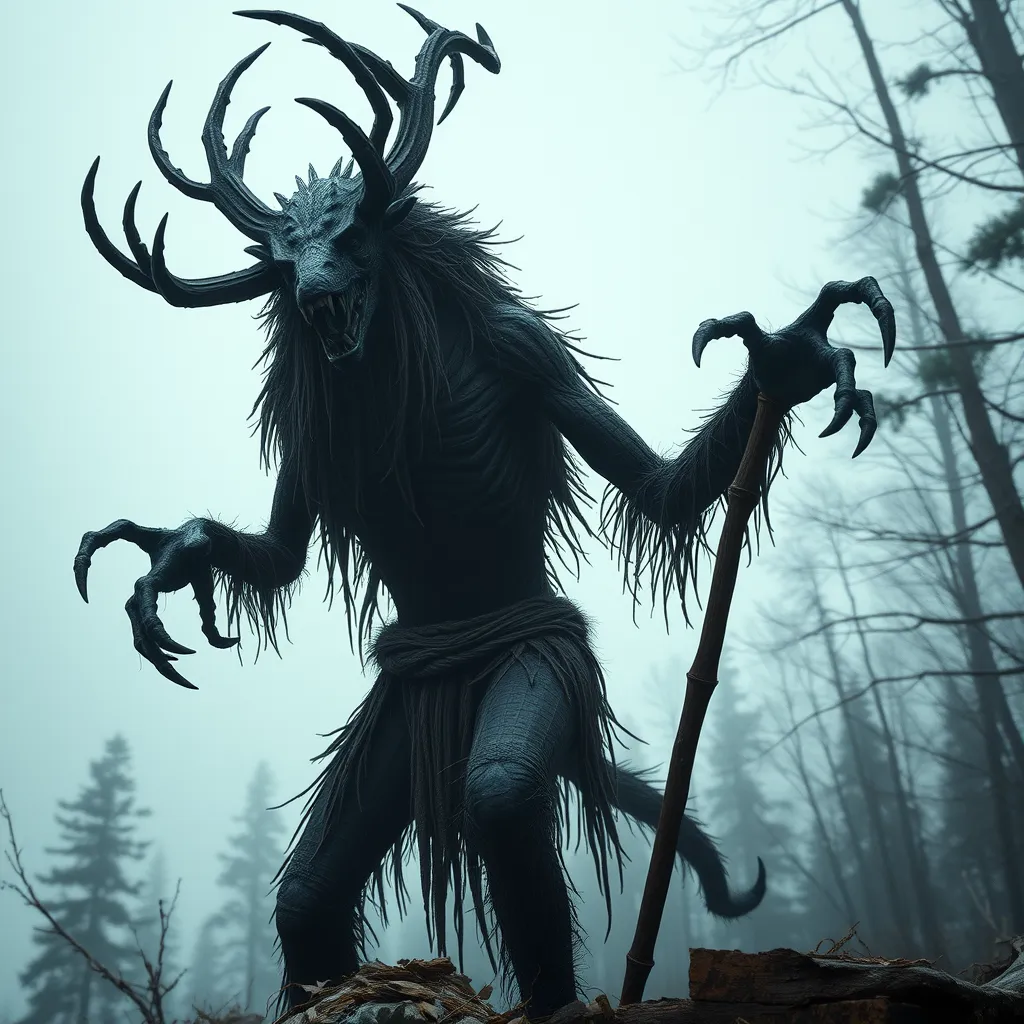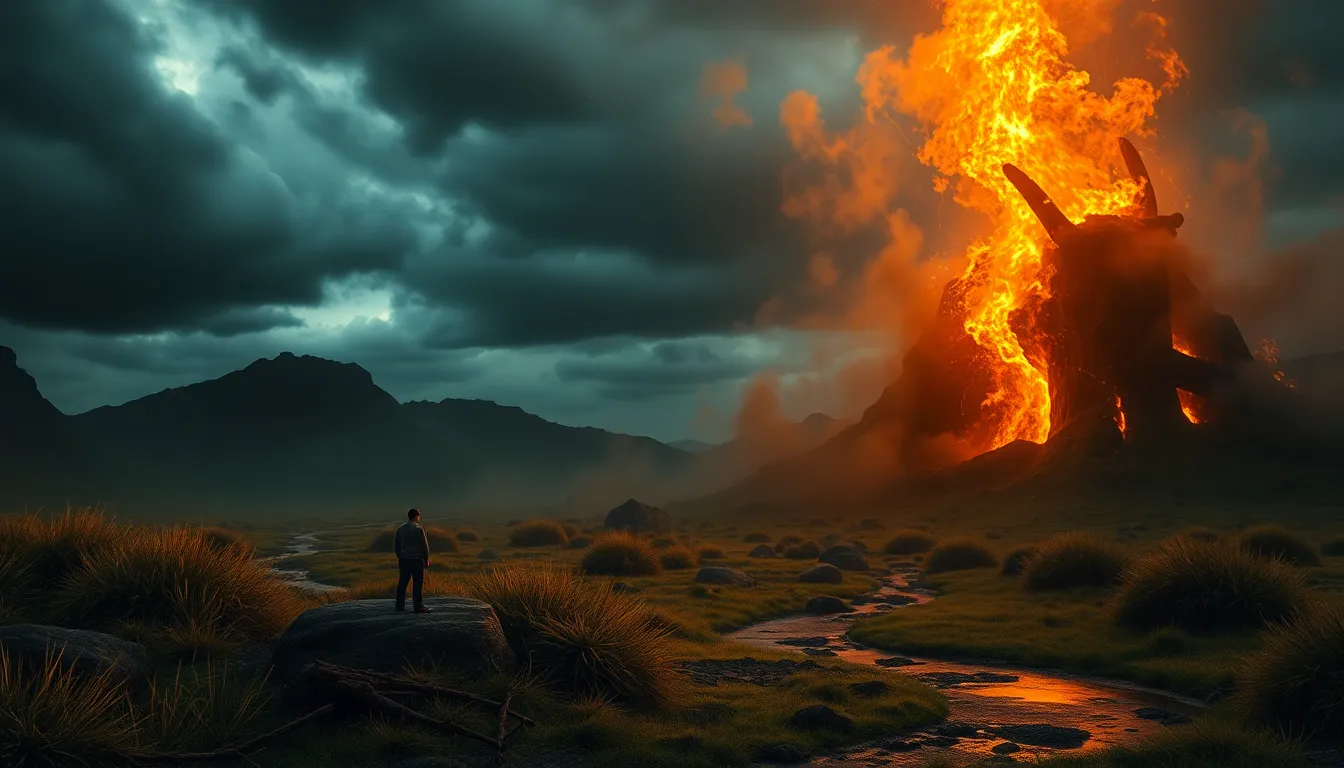The Wendigo’s Legacy: How This Myth Continues to Influence Modern Culture and Thought
I. Introduction
The Wendigo is a legendary creature rooted in the folklore of the Algonquian-speaking peoples of North America. Typically depicted as a malevolent, cannibalistic spirit, the Wendigo embodies the consequences of greed and the insatiable hunger for consumption. Its origins can be traced back to ancient stories shared among Indigenous tribes, where it served as both a cautionary tale and a representation of the harsh realities of survival.
This myth holds profound significance in Indigenous cultures, often symbolizing the struggle against nature and the moral implications of human behavior. As we delve into this article, we will explore how the Wendigo myth has transcended its origins, continuing to influence contemporary culture, literature, and societal thought.
II. Historical Context of the Wendigo Myth
The Wendigo has deep roots in Algonquian folklore, where it is described as a creature that was once a human who succumbed to the lure of cannibalism during times of extreme hunger. The transformation into a Wendigo is often seen as a result of violating cultural taboos surrounding food and survival.
Symbolically, the Wendigo represents the darker aspects of human nature, particularly the extremes one might go to in the name of survival. This myth evolved through oral traditions, where stories were passed down generations, each retelling adding layers to the Wendigo’s character and significance.
III. The Wendigo in Literature and Storytelling
The themes associated with the Wendigo have permeated various forms of literature, from classic tales to modern horror fiction. In classic literature, the Wendigo often symbolizes the conflict between civilization and the primal instincts of humanity.
- Classic Literature: Works such as Algernon Blackwood’s “The Wendigo” delve into the psychological horror of the myth, presenting the creature as a reflection of human fears and desires.
- Modern Horror: Contemporary authors and filmmakers have reinterpreted the Wendigo in various ways, often amplifying its monstrous traits to explore themes of isolation and madness.
The impact of the Wendigo on character archetypes is evident in the horror genre, where it often serves as a catalyst for the protagonist’s transformation or downfall. The narrative of an individual succumbing to their inner demons is a common thread in many Wendigo-inspired tales.
IV. The Wendigo in Popular Media
In recent years, the Wendigo has found its way into films and television series, often portrayed as a terrifying antagonist. Its representation has evolved, reflecting changing societal fears and the fascination with the supernatural.
- Films and Television: Movies like “Ravenous” and series such as “Channel Zero: Butcher’s Block” highlight the Wendigo’s connection to cannibalism and the human psyche.
- Video Games: In interactive storytelling, games like “Until Dawn” incorporate the Wendigo myth, utilizing its horror elements to enhance gameplay and narrative depth.
Furthermore, social media has played a pivotal role in perpetuating the Wendigo legend, with platforms allowing for the sharing of stories, artwork, and discussions surrounding this myth, thus keeping the Wendigo’s legacy alive in contemporary culture.
V. Psychological and Sociological Implications
The Wendigo myth serves as a powerful metaphor for greed and consumption in modern society. Its association with cannibalism can be seen as a reflection of cultural anxieties regarding overconsumption and environmental degradation.
- Greed and Consumption: The Wendigo’s insatiable hunger symbolizes the destructive nature of unchecked desire in contemporary life.
- Cannibalism and Survival Instincts: The myth prompts an analysis of ethics in survival situations, mirroring real-life dilemmas faced in extreme conditions.
Additionally, the Wendigo has implications for mental health discussions, representing the fears and struggles individuals face in a society driven by competition and materialism.
VI. The Wendigo in Contemporary Spirituality and Belief Systems
In recent years, there has been a revival of interest in Indigenous spiritual practices, with the Wendigo often featured in discussions of cultural identity and spirituality.
- Indigenous Spiritual Practices: The Wendigo is acknowledged in various Indigenous ceremonies and teachings, representing a connection to ancestral wisdom and the natural world.
- New Age Interpretations: Some modern interpretations of the Wendigo have emerged in New Age contexts, often distorting the original meanings and significance.
This raises important questions about cultural appropriation, as the commodification of Indigenous stories can lead to misrepresentation and disrespect for the beliefs of Indigenous peoples.
VII. The Wendigo as a Cautionary Tale
The Wendigo myth offers valuable lessons in various contexts, particularly concerning environmental ethics and consumption.
- Environmental Contexts: The Wendigo serves as a reminder of the consequences of overexploitation of resources and the importance of living in harmony with nature.
- Ethical Consumption: Discussions surrounding the Wendigo encourage reflection on personal consumption habits and their broader implications for society and the planet.
Folklore, such as the Wendigo myth, plays a crucial role in addressing contemporary social issues, prompting individuals and communities to engage with the moral dilemmas of modern life.
VIII. Conclusion
The legacy of the Wendigo continues to resonate in contemporary culture, reminding us of the complexities of human nature and the ethical considerations we face in our daily lives. Understanding cultural myths like the Wendigo is essential for fostering a deeper appreciation of Indigenous stories and beliefs.
As we navigate a world increasingly defined by consumption and competition, it is crucial to engage with these narratives respectfully and thoughtfully, honoring the wisdom they offer for our collective future.



